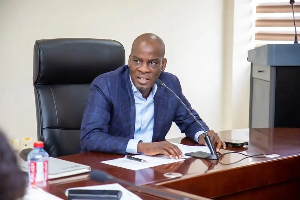The Governor of the Bank of Ghana (BoG) Dr Ernest Addison appeared before the Public Accounts Committee (PAC) of Parliament on Wednesday June 24 to answer questions relating to the report of the Auditor-General on the statement of foreign exchange receipts and payments of the BoG for 2017 and 2018.
During the hearing, Ningo Prampram Lawmaker, Samuel Nartey George asked the Governor several questions about the cedi’s performance, questions the central bank boss answered.
Read below the transcript of what transpired between Sam George and Dr Addison at the hearing
Sam George: Mr Chairman, I want to find out from the Governor: Does forex depreciation or the cedi depreciation play any role in boosting the profits or the profitability of the central bank?
Dr Addison: Well, it depends. Some times on the net foreign assets position of the central bank if your net foreign asset position is positive, you have more assets in foreign exchange than liabilities. Obviously, if the cedi depreciates, as a net foreign assets holder or foreign exchange, you’re in a better position.
On the other hand, if you look at it on the net liability situation then if the cedi depreciates you have a bigger problem. So it depends on the structure of the account at a point in time.
Sam George: So will it be fair to say that when the cedi depreciates, for example, let us assume that you are holding forex for some of the commercial banks to the tune of over $100million, and at the beginning of the year the cedi was pegged at 5 , so then that was GHS500million equivalent. And then the cedi depreciates to 6 by end of year, it then means that in cedi reporting you are reporting holdings of 600million and at that 100million is going to reflect as profit in the operations of the central bank . Will it then be fair to suggest that at times the central bank allows for depreciation so that you can post profit?
Dr Addison: Let me say that the objective of policy at the central bank is about stability, price and exchange rate stability. The central bank does not look at profitability as a criteria. So we focus on the mandate of the Bank of Ghana and that is what takes priority in all the analyses and the decisions that the bank takes.
Sam George: Mr Chairman, I appreciate the governor’s response but the point I am just seeking to make here is that, does the cedi depreciation play any role in the reporting of profitability, even though that may not be your principal , you do report profits and it is widely carried when the central bank declares profit . In fact at times you borrow to government as we have seen recently on the back of your profitability. Does that profit emerge from or does the depreciation of the cedi affect that profitability?
Dr Addison: I think the profitability of the central bank depends on many factor . If you recollect in 2018 the central bank made a very large loss . This was due to impairment of liquidity supports that the central bank had given to the commercial banks that became insolvent . That is what dominated the financial outcome for 2018 .
In 2019 we did not have a lot of those type of impairments and that is the reason why the central bank was able to generate a few more profits in that year than the year before so it is not the entirely true that it is only driven by the performance of the cedi .
Sam George: So basically your response is that that may be one factor but not the only factor.
Dr Addison: Exactly.
Sam George: That is fair to agree to. A constituent says I should ask you, when she heard that you were coming to today, that her daughter is in school, an international school here in Ghana. The Bank of Ghana has issued warnings on transactions in US dollars in Ghana but the school bills in dollars , like many other international schools and businesses in Ghana. They will ask you to remit in cedis so that it doesn’t appear as though they are flouting the bank of Ghana’s rule, however, the fees fluctuate every time there is a fluctuation in the exchange rate . Is that not a clever way of beating around charging in dollars since the remittances in cedis are not fixed but are dependent on the currency fluctuations. What is the position of the central bank on such practice?
Dr Addison: As you are aware the central bank has come out very clearly on trying to declare dollarization illegal and we have gone round trying to stop people from pricing and invoicing in US dollars . But what you described is the situation in which the school is indexing its charges to the exchange rate . They can decide to index their charges to the consumer price index , that is another way of measuring what the change in cost of living is.
And we found out that people are more interested indexing to the dollar rather than indexing to the CPI. I think that if you look at the stability that we are seeing in the exchange rate , may be they better be indexing on the CPI , which if you look at where the inflation rate is today at 10.6%, that is much higher than indexation to the dollar. That I think it reduces the incentives for dollarization . When you have a stabled currency that is not depreciating very fast , you don’t have widespread dollarisation because the incentive is not there .
Sam George: Mr Governor, as to the question of stability of the cedi I think that those watching us will tell that at the beginning of the year you could buy the cedi at your bank at 5.2 , not interbank rate , if you are buying from the bank. Today from the bank it is 5.9 or 5.7 depending on whether you are buying or selling so as to the stability of the cedi in six months that is opened for pubic conversation , however ,what I am asking you as the governor of the central bank is; does the central bank not have a problem with people indexing their prices to the USD and allowing currency fluctuations affect pricing in cedi , then that will negate your directives of not pricing in dollars . Then it means your pricing in dollars directive is cosmetics if you have no qualms with people doing indexing against the US dollar.
Dr Addison: We already said that we do not encourage invoicing in foreign currency . We have already said that we do not support dollarization , But pricing generally in the economy is on the basis of an assessment of conditions and typically the consumer pricing index which is the rate of inflation is what would normally be used as the benchmark . Even for wage adjustments when the labour goes to negotiate with their employers they look at the change in the cost of living and use the inflation rate as an adjustment factor . So all that I am saying is that , now that we have a relatively stable currency the incentive to index in the US dollar is not there , but yes it is illegal to be pricing in dollars.
Sam George: Mr Chairman the governor of tactfully not addressing the critical issue I am raising which is the issue of; is it lawfully to index in the dollar because take for example if you are indexing against the CPI you may not see a significant of any movement within a particular term which is most time, a 10 week period from the commencement of the term to the end of the term when I am using school fees for example , however if you are using indexing against the USD you can realize that within a period of two to three weeks the fees will continue to fluctuate because yes , you may talk about relative stability but the cediis depreciating . Is the central bank governor telling the committee and Ghanaians at large that there are no punitive measures for indexing against the USD so that then we understand that , so long as you don’t invoice in dollars but you invoice in cedis relative to a cedi depreciation or currency depreciation it is fine .
Dr Addison: I did not say that I am saying that dollarization is illegal , you are not allowed to invoice in USD .
Sam George: How then do we deal with the issue of people indexing against the dollar because not to invpice in dollars , that is just on paper, the fact that I don’t put the dollar sign against it but I am constantly doing a change on the basis ongoing currency fluctuations, it is the same thing
Dr Addison: So Honorable You want me to say that it is illegal it is illegal for you to index in dollar? Yes it is illegal to invoice in USD , it is illegal to index in USD.
Sam George : So then I can make a complaint to the central bank of anybody who is doing indexing against the USD and the central bank will initiate punitive measures.
Dr Addison: We will investigate it
Sam George : Thank you very much.
Business News of Thursday, 25 June 2020
Source: laudbusiness.com













